Sedimat 4-12
Sedimat 4-12
The Sedimat 4-12 is a laboratory instrument for the automated determination of the particle size distribution in mineral soils according to DIN ISO 11277 (Köhn analysis) on up to 12 samples with 4 fractions (<0.002 mm to <0.063 mm). Optionally, 2 fractions can be determined according to US nomenclature.
How does the Sedimat 4-12 work?
The KÖHN analysis according to DIN ISO 11277 is so far the only rational measuring method which provides identical results to the sedimentation analysis with the same dependence on the grain shape. In this method, the sinking velocity of soil particles is investigated at 25 °C on a previously homogenized soil sample separated from carbonates and organic matter. The results are used, for example, to generate grain sum curves, which form the basis for many soil physical investigations.
The fine soil is composed of the fractions coarse silt (gU), medium silt (mU), fine silt (fU) and clay (T). This is illustrated by the grain size triangle. Due to the different grain sizes (<2.0 µm to <63 µm) and grain shapes, the individual fractions have different sinking velocities. By controlled sedimentation of the homogenized soil suspension, the individual fractions are separated on the basis of the different sinking velocities and thus quantified.
The separation of the fractions is done by pipetting analysis. During the sinking process, defined volumes are taken from the suspension at a defined height at defined times, and their mass of solids content is determined afterwards. Due to the high accuracy requirements, the manual test procedure involves many sources of error, such as deviations in the immersion depth of the piepette or the sampling time, and is very tedious due to the slow sinking speed of fine soil particles.
Benefits of the Sedimat 4-12
By automating this measurement procedure, the amount of work is significantly reduced and accuracy is increased. Subjective measurement errors are eliminated. Temperature fluctuations, vibrations and turbulence, which have a great influence on measurement accuracy, are also minimized. Since the work is limited to sample preparation and evaluation, the Sedimat 4-12 can be used to perform a complete KÖHN analysis on 12 samples for all 4 fractions per working day. The exact adherence to the test parameters for homogenization, temperature control and pipetting leads to a statistically reliable result. The scattering factor in case of repetition on the same samples is <1 % with the sediment (related to the weighed sample).
Paul R. (2004): Automated grain size analysis according to KÖHN. Series of publications of the TLL 48-55.

Training on sample preparation
We offer training in field sampling for use in the SEDIMAT 4-12. The training includes:
- the preparation, the documentation and the sampling instruments
- Soil sampling in the field
- Sample transport
- preparation (sieving, drying, storage)
Training Sedimat 4-12
- Sample pre-treatment for analysis: weighing, humus destruction, removal of soluble salts, homogenization, wet sieving
- Samples analysis with laboratory automat Sedimat 4-12
- Analytical values
- Compilation of results
- Soil type determination (digital)
The trainings take place in the field or in our premises. We are happy to offer training at your site.
|
SEDIMAT 4-12 |
Specifications |
|
Width minimum/ maximum |
218 cm/ 280 cm |
|
Depth minimum/maximum |
90 cm/ 158 cm |
|
Height |
206 cm |
|
Total weight (ready for operation) |
approx. 400 kg |
|
Material |
Aluminum and PE |
|
Power supply |
CEE16, 16 A 3 N/PE AC 380 V/50 Hz |
|
External minichiller |
|
|
Width x depth x height |
225 x 360 x 380 mm |
|
Max. delivery rate |
14 l/min |
|
Max. delivery pressure |
0.25 bar |
|
Cooling capacity |
0.3; 0.2; 0.14; 0.07 kW |
|
Refrigerant and quantity |
R290; 0.041 l |
|
Program run times with 12 samples and 30 minutes sample heating time to 25°C |
DIN ISO 11277 |
ASTM |
|
Fraction 1: coarse silt |
approx. 1.5 h |
approx. 1.5 h |
|
Fraction 2: medium silt |
approx. 2 h 10 min |
approx. 8 h |
|
Fraction 3: fine silt, |
approx. 2 h |
|
|
Fraction 4: Clay |
approx. 8 h |
|
|
Fraction 1 to 4 / 2 |
approx. 11 h 45 min |
approx. 9 h |
